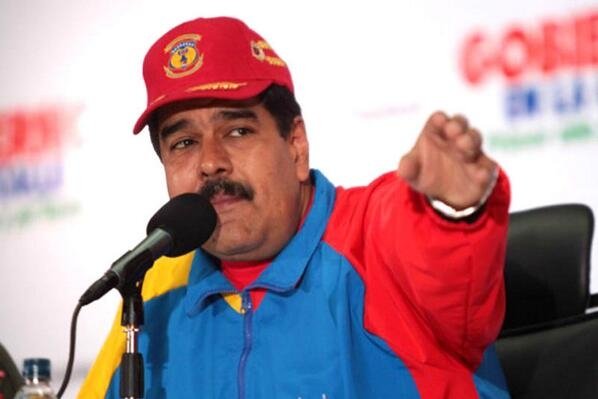In a speech to supporters in Venezuela’s capital Caracas, President Nicolas Maduro has threatened the seizure of factories that have stopped production, and the jailing of their owners.
Nicolas Maduro said Venezuela had to recover the means of production, to counter its deep economic crisis.
On May 13, the president introduced a new, nationwide state of emergency.
Meanwhile, opposition protesters have been rallying in Caracas to push for a recall vote to eject Nicolas Maduro from power.
The Venezuelan leader said the state of emergency was needed to combat foreign aggression, which he blamed for the country’s problems.
Nicolas Maduro said military exercises would take place next weekend to counter “foreign threats”.
Venezuela has the world’s largest oil reserves but its economy has been severely hit by falling global oil prices. The country’s economy contracted by 5.7% last year and its official inflation rate is estimated to be topping 180%.
There are severe shortages of food, medicines and basic goods which Nicolas Maduro argues are due to business leaders and the US waging an economic war against his government.
The threat to seize closed factories came after Venezuela’s largest food and beverage company, the Polar Group, halted production of beer, blaming government mismanagement for stopping it importing barley.
The Polar Group’s billionaire owner, Lorenzo Mendoza, is a fierce critic of President Nicolas Maduro.
Nicolas Maduro told supporters at the Caracas rally: “We must take all measures to recover productive capacity, which is being paralyzed by the bourgeoisie.
“Anyone who wants to halt [production] to sabotage the country should get out, and those who do must be handcuffed and sent to the PGV [Venezuelan General Penitentiary].
“We’re going to tell imperialism and the international right that the people are present, with their farm instruments in one hand and a gun in the other… to defend this sacred land.”
On May 13, President Nicolas Maduro declared a full-blown state of emergency, expanding the state of “economic emergency” he had announced in January.
In an address to the nation, Nicolas Maduro said the measures would be in place for three months but would likely be extended over 2017.
The president did not specify if there would be limits to other constitutional rights but he said the decree would provide “a fuller, more comprehensive protection for our people.”
A previous state of emergency was implemented in states near the Colombian border in 2015.
It suspended constitutional guarantees in those areas but did not suspend guarantees related to human rights.
Venezuela’s Minister for Communication and Information Luis Jose Marcano said the state of emergency would allow the government more resources to distribute food, basic goods and medicines.
Luis Jose Marcano added that it also created “mechanisms for the security forces to be able to guarantee public order needed because of the threats by armed groups”.
The opposition has collected and submitted a petition with 1.8 million signatures in favor of a referendum on Nicolas Maduro, but the National Electoral Board (CNE) has so far not verified them.
The verification process was supposed to take five days but 12 days have already elapsed.
Opposition activists say authorities are not letting them proceed to the next stage when they must collect another four million signatures.
Addressing the crowds on May 14, opposition leader and former presidential candidate Henrique Capriles said: “We want a country without queues, where we can find medicines. We want change.”
Henrique Capriles described Venezuela as a “time bomb that can explode at any given moment”.
According to the Venezuelan Constitution, if a referendum is held before the end of the year, a recall vote against Nicolas Maduro would trigger new elections.
